

All Nobel Prizes. Between 1901 and 2013, the Nobel Prizes and the Prize in Economic Sciences were awarded 561 times to 876 people and organizations.
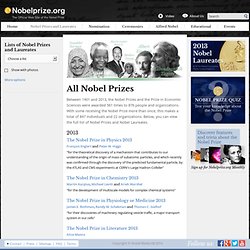
With some receiving the Nobel Prize more than once, this makes a total of 847 individuals and 22 organizations. Below, you can view the full list of Nobel Prizes and Nobel Laureates. The Nobel Prize in Physics 2013 François Englert and Peter W. Higgs "for the theoretical discovery of a mechanism that contributes to our understanding of the origin of mass of subatomic particles, and which recently was confirmed through the discovery of the predicted fundamental particle, by the ATLAS and CMS experiments at CERN's Large Hadron Collider"
RSS Feed for Tags in YouTube. THE ORIGIN OF UNIVERSITIES. "I will skip through time and space / So you can find a sense of place" -- Jamie Janczak’s project: "Dr. Seuss at Oxford" Shangyang, "higher school," China, established sometime during the Yu period: 2257-2208 BC Imperial Central School, established sometime in Zhou Dynasty: 1046-249 BC ("The early Chinese state depended upon literate, educated officials for operation of the empire, and an imperial examination was established in the Sui Dynasty (581–618) for evaluating and selecting officials from the general populace. ") Takshashila University, Taxila, Pakistan, 7th c. What happened to the great library of Alexandria? A Staff Report from the Straight Dope Science Advisory Board December 6, 2005 Dear Straight Dope: As a history buff, I've never found a good answer anywhere to this question, namely, just how was the great library of Alexandria destroyed?
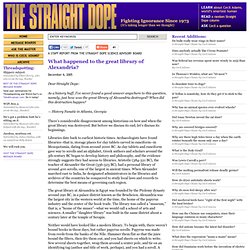
When did this destruction happen? A Visual Timeline of the Future. By Maria Popova The past has a long history of imagining the future, and humanity has an equally long history of mapping time.
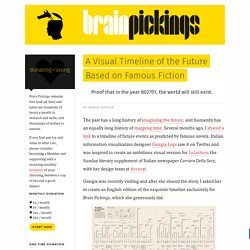
Several months ago, I shared a link to a timeline of future events as predicted by famous novels. As We May Think: A 1945 Essay on Information Overload, "Curation," and Open-Access Science. By Maria Popova “There is a new profession of trail blazers, those who find delight in the task of establishing useful trails through the enormous mass of the common record.”
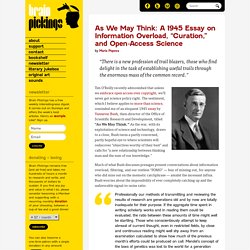
Tim O’Reilly recently admonished that unless we embrace open access over copyright, we’ll never get science policy right. Eurocrat addresses copyright issues. *Huh, I’ve never seen an intellectual property system that helped artists live by their art.
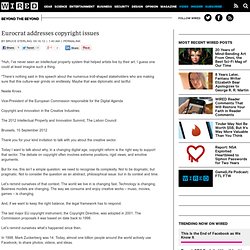
I guess one could at least imagine such a thing. *There’s nothing said in this speech about the numerous troll-shaped stakeholders who are making sure that this culture-war grinds on endlessly. Maybe that was diplomatic and tactful. Neelie Kroes Vice-President of the European Commission responsible for the Digital Agenda. Be an Information DJ - Matthew Lieberman. By Matthew Lieberman | 1:02 PM November 27, 2012 When President Obama considers how to mobilize opinion and persuade Americans to support his agenda, we can be sure he’ll want to tap the power of changing minds by understanding what makes ideas go viral.
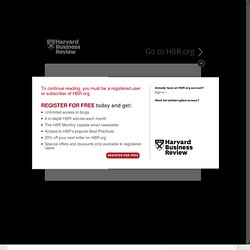
In building support for tough, difficult issues such as deficit reduction and tax policy, the Obama team will want to know more about how buzz works in the brain. David Byrne on How Music and Creativity Work. By Maria Popova “Presuming that there is such a thing as ‘progress’ when it comes to music is typical of the high self-regard of those who live in the present.
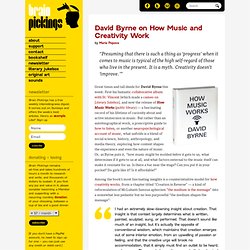
It is a myth. Creativity doesn’t ‘improve.’” 2012-08.pdf (application/pdf Object) Lour film of 1901, judged world's earliest ever, found at media museum. There is not much of a plot – goldfish in bowl – but the scene and others from the same rolls of film were revealed on Wednesday as the earliest colour moving images ever made in a discovery that does nothing less than "rewrite film history".
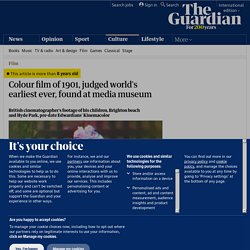
The National Media Museum in Bradford said it had found what it contends are truly historic films from 1901/02, pre-dating what had been thought to be the first successful colour process – Kinemacolor – by eight years. "We believe this will literally rewrite film history," said the museum's head of collections, Paul Goodman. "I don't think it is an overstatement. Ezra Pound's List of the 6 Types of Writers and 2 Rules for Forming an Opinion. Computing and Visualizing the 19th-Century Literary Genome. Overview In literary studies, we have no shortage of anecdotal wisdom regarding the role of influence on creativity.
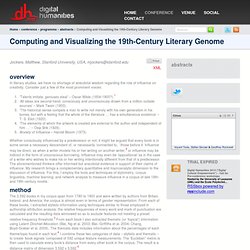
Consider just a few of the most prominent voices: ‘Talents imitate, geniuses steal’ – Oscar Wilde (1854-1900?). 1‘All ideas are second hand, consciously and unconsciously drawn from a million outside sources’ – Mark Twain (1903). ‘The historical sense compels a man to write not merely with his own generation in his bones, but with a feeling that the whole of the literature … has a simultaneous existence’ – T. Clay Shirky: Unlocking Mankind’s Untapped Potential. How much information is there in the world? Abstract How much information is there in the world?
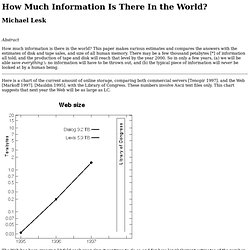
This paper makes various estimates and compares the answers with the estimates of disk and tape sales, and size of all human memory. Data, data everywhere. WHEN the Sloan Digital Sky Survey started work in 2000, its telescope in New Mexico collected more data in its first few weeks than had been amassed in the entire history of astronomy. Now, a decade later, its archive contains a whopping 140 terabytes of information. A successor, the Large Synoptic Survey Telescope, due to come on stream in Chile in 2016, will acquire that quantity of data every five days.
The Amount of Information in the World. According to the latest accounting of how much information capacity there is in the world, the tide of information we have unleashed is rising far faster than anyone expected. The flood of information is now a long-term tsunami. Computing capacity is increasing at 58% annually, telecommunications at 28%, and storage at 23% per year. The former rate is approximately the rate of Moore’s Law, a doubling every 18 months. Internet Archive: Digital Library of Free Books, Movies, Music & Wayback Machine. Google: There Are 129,864,880 Books in the Entire World.
How many books have ever been published in all of modern history? According to Google's advanced algorithms, the answer is nearly 130 million books, or 129,864,880, to be exact. We'll admit it's practically impossible to count every book that has ever been written, but in order for Google Books to successfully catalog the world's supply of printed knowledge, the company needs an estimate of the amount of books it needs to scan.
Books of the world, stand up and be counted! All 129,864,880 of you. Posted by Leonid Taycher, software engineer When you are part of a company that is trying to digitize all the books in the world, the first question you often get is: “Just how many books are out there?” Well, it all depends on what exactly you mean by a “book.” We’re not going to count what library scientists call “works,” those elusive "distinct intellectual or artistic creations.” It makes sense to consider all editions of “Hamlet” separately, as we would like to distinguish between -- and scan -- books containing, for example, different forewords and commentaries. How Many New Novels are Published Each Year? « Work Product. Welcome to Open Library. The Greatest Books of All Time, As Voted by 125 Famous Authors.
Francis Bacon on Studies. Carl Sagan's Reading List. An Unquiet History of Libraries and Navigating Knowledge, from Alexandria to the Internet. 110 best books: The perfect library. Italo Calvino's 14 Definitions of What Makes a Classic. How To Talk About Books You Haven't Read. Henry Miller on Reading, Influence, and What's Wrong with Education. What To Read Next. Ars longa, vita brevis, said Hippocrates—more or less: time’s a-wastin’. Essay on the digital humanities' data problem. In 2010, the National Science Foundation and National Endowment for the Arts convened a historic workshop -- it was their first jointly funded project. Broadcast Yourself. Welcome to YouTube! Database Statistics. Dear Videogame Industry, Please Stop Making Games - Page 1. By Michael Drucker | Feb 9, 2010. Timeglider: Web-based Timeline Software.
Transcribe Videos And Make Them Searchable With Koemei. Being able to search for video clips like we search web pages would be enormously useful. Category:Lists of compositions by composer. Is there too much music? iTunes - Learn about the features of iTunes 10. Are all melodies taken? Factual.
Free World Cities Database. The size of the World Wide Web (The Internet) Worldometers - real time world statistics. Tree of Life Web Project. Virtual Exploration of the Chemical Universe up to 11 Atoms of C, N, O, F: Assembly of 26.4 Million Structures (110.9 Million Stereoisomers) and Analysis for New Ring Systems, Stereochemistry, Physicochemical Properties, Compound Classes, and Drug Discov. UCS Satellite Database. SDSS-III. Huge New 3-D Map of Universe's Massive Galaxies & Black Holes. Gapminder. Canonizer Main Page. ChronoZoom.
Recorded Future Attempts To Unlock The Predictive Power Of The Web. How To Build A Basic Web Crawler To Pull Information From A Website (Part 1) Are books and the internet about to merge? A Universe Of Self-replicating Code. Natural Language Processing. The Story of Meehan’s Tale-Spin. How many words are there in the English language? What if all human knowledge was free and accessible? New York Times Data Artist Jer Thorp on Humanized Data at the Intersection of Science, Art, and Design. Consilience: The Unity of Knowledge (9780679768678): Edward Osborne Wilson. Google’s Eric Schmidt On Collective Intelligence: “In God We Trust…But All Others Bring Data”
A Whole New Mind: Moving from the Information Age to the Conceptual Age (9781573223089): Daniel H. Pink. The Cost of Knowledge. 8,200+ Strong, Researchers Band Together To Force Science Journals To Open Access. DeepDyve - Millions of Articles At Your Fingertips. Can A Free Online Education Land You A Job? The Era Of Online Education Dawns. This Will Make You Smarter: 151 Big Thinkers Each Pick a Concept to Enhance Your Cognitive Toolkit.
Summer Reading List 2012: 10 Essential Books for Cognitive Sunshine. Reaching the Reluctant Learner:Turning On the Lights. Everything Is A Remix, Part 4. Introducing The Curator's Code: A Standard for Honoring Attribution of Discovery Across the Web. H-index. Causality: Models, Reasoning and Inference (9780521895606): Judea Pearl. Is Piracy Theft. Why I Pirate - An Open Letter To Content Creators - Insight Community. Radiohead's Thom Yorke predicts end of music industry.
What is Music 2.0? Music 2.0 - Exploring Chaos in Digital Music.